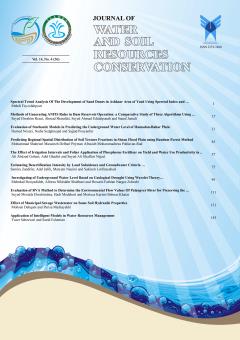Methods of Generating ANFIS Rules in Dam Reservoir Operation: a Comparative Study of Three Algorithms Using Fuzzy Performance Criteria
Subject Areas : Water resources managementSeyed Ebrahim Rezai 1 , Ahmad Sharafati 2 * , Seyed Ahmad Edalatpanah 3 , Saeed Jamali 4
1 - PhD student, Department of Construction and Water Management, Islamic Azad University, Science and Research Unit, Tehran, Iran
2 - Associate Professor, Department of Construction and Water Management, Islamic Azad University, Science and Research Unit, Tehran, Iran
3 - Assistant Professor, Department of Mathematics, Future Higher Education Institute, Tonkaban, Iran.
4 - Assistant Professor, Department of Civil Engineering, Islamic Azad University, Tehran Branch, Tehran, Iran.
Keywords: Optimal reservoir operation, Grid partitioning, Subtractive clustering and Fuzzy C-Means,
Abstract :
Background and Aim: The performance of water resources systems is very sensitive to uncertainty in model inputs. In this paper, adaptive neuro-fuzzy inference system (ANFIS), which is an improvement of fuzzy theories, is used to solve the optimization problem of reservoir operation. The main idea in this article is to consider hydrological uncertainties in ANFIS models based on Grid partitioning, Subtractive clustering and Fuzzy C-Means in dam reservoir operation and compare them using classical and fuzzy performance criteria.
Method: It is a case study about the problem of simple operation of Dez dam reservoir in single-reservoir state.
First, the problem of optimizing the use of Dez dam reservoir with the aim of minimizing the lack of needs has been solved by using modeling training data. To solve the optimization problem, the Ant Colony Optimization (ACO) algorithm with a new mechanism called Stochastic Adaptive Refinement (SAR) has been used.
Then, its results have been used to infer the behavior of the system in Anfis and compare three methods of division. In order to compare the methods, in addition to the error criteria, the reservoir performance criteria have been fuzzified and compared with the classical performance criterias. Finally, Mamdani, Sogeno and ANFIS fuzzy inference methods have been compared by using FCM.
Results: Fuzzy performance criteria indicate that FCM and subtractive clustering have improved fuzzy performance criteria compared to the optimal method in test data, and FCM has improved the objective function of the training and test data by 14% and 16%, respectively. The Grid partitioning method has not achieved good results. Sugeno's fuzzy inference has a better performance than Mamdani's in inferencing system behavior, and Anfis has also improved the objective function compared to Sugeno's
Conclusion: Fuzzification of performance criteria provides more realistic criteria to professionals. FCM and then subtractive clustering are efficient methods in partitioning and generating fuzzy rules in inferencing system behavior. Therefore, ANFIS based on FCM can be used as an efficient method for dam reservoir operation.
Anto Soentoro, E., & Pebriana, N. (2019). Fuzzy rule-based model to optimize outflow in single reservoir operation. MATEC Web of Conferences, 270, 04015. https://doi.org/10.1051/matecconf/201927004015
Afshar,M.H., Rezai, S.E., & Moeini, R. (2010). An Optimized Reservoir Operation with Stochastic Adaptive Refinement in Ant Algorithms. Iran-Water Resources Research, 6(1), 12–14. [In Persian]
Bae, D.-H., Jeong, D. M., & Kim, G. (2007). Monthly dam inflow forecasts using weather forecasting information and neuro-fuzzy technique. Hydrological Sciences Journal, 52(1), 99–113.
Deka, P. C., & Chandramouli, V. (2009). Fuzzy Neural Network Modeling of Reservoir Operation. February, 5–12.
El‐Baroudy, I., & Simonovic, S. P. (2004). Fuzzy criteria for the evaluation of water resource systems performance. Water Resources Research, 40(10).
Fattahi, H. (2016). Indirect estimation of deformation modulus of an in situ rock mass: an ANFIS model based on grid partitioning, fuzzy c-means clustering and subtractive clustering. Geosciences Journal, 20(5), 681–690.
Goguen, J. A. (1973). LA Zadeh. Fuzzy sets. Information and control, vol. 8 (1965), pp. 338–353.-LA Zadeh. Similarity relations and fuzzy orderings. Information sciences, vol. 3 (1971), pp. 177–200. The Journal of Symbolic Logic, 38(4), 656–657.
Haryati, A. E., Sugiyarto, S., & Putri, R. D. A. (2021). COMPARISON OF FUZZY SUBTRACTIVE CLUSTERING AND FUZZYC-MEANS. Jurnal Ilmiah Kursor, 11(1).
Hellendoorn, H., & Thomas, C. (1993). Defuzzification in fuzzy controllers. Journal of Intelligent & Fuzzy Systems, 1(2), 109–123.
Jang, J. S. R. (1993). ANFIS: Adaptive-Network-Based Fuzzy Inference System. IEEE Transactions on Systems, Man and Cybernetics, 23(3), 665–685. https://doi.org/10.1109/21.256541
Loucks, D. P., Stedinger, J. R., & Haith, D. A. (1981). Water resource systems planning and analysis. Prentice-Hall.
Mamdani, E. H., & Assilian, S. (1975). An experiment in linguistic synthesis with a fuzzy logic controller. International Journal of Man-Machine Studies, 7(1), 1–13.
Mohammed, M., Sharafati, A., Al-Ansari, N., & Yaseen, Z. M. (2020). Shallow Foundation Settlement Quantification: Application of Hybridized Adaptive Neuro-Fuzzy Inference System Model. Advances in Civil Engineering, 2020. https://doi.org/10.1155/2020/7381617
Palconit, M. G. B., Conception II, R. S., Alejandrino, J. D., Nuñez, W. A., Bandala, A. A., & Dadios, E. P. (2021). Comparative ANFIS Models for Stochastic On-road Vehicle CO 2 Emission using Grid Partitioning, Subtractive, and Fuzzy C-means Clustering. 2021 IEEE 9th Region 10 Humanitarian Technology Conference (R10-HTC), 1–6.
Pramanik, N., & Panda, R. K. (2009). Application of neural network and adaptive neuro-fuzzy inference systems for river flow prediction. Hydrological Sciences Journal, 54(2), 247–260.
Safavi, H. R., Chakraei, I., Kabiri-Samani, A., & Golmohammadi, M. H. (2013). Optimal Reservoir Operation Based on Conjunctive Use of Surface Water and Groundwater Using Neuro-Fuzzy Systems. Water Resources Management, 27(12), 4259–4275. https://doi.org/10.1007/s11269-013-0405-1
Safavi, H. R., & Gol Mohammadi, M. H. (2016). Evaluating the water resource systems performance using fuzzy reliability, resilience and vulnerability. Iran-Water Resources Research, 12(1), 68–83.
Takagi, T., & Sugeno, M. (1985). Fuzzy identification of systems and its applications to modeling and control. IEEE Transactions on Systems, Man, and Cybernetics, 1, 116–132.
Tarazkar, M. H., Soltani, G. R., & Nooshadi, M. (2018). Determining the Operating Rules Of Doroodzan Reservoir Using the Adaptive Network Fuzzy Inference System (ANFIS). JWSS-Isfahan University of Technology, 22(2), 261–276.
Tomas, K., & Milos, S. (2021). Adaptive Management of the Storage Function for a Large Reservoir Using Learned Fuzzy Models. Water Resources, 48(4), 532–543.
Yeom, C.-U., & Kwak, K.-C. (2018). Performance comparison of ANFIS models by input space partitioning methods. Symmetry, 10(12), 700.

